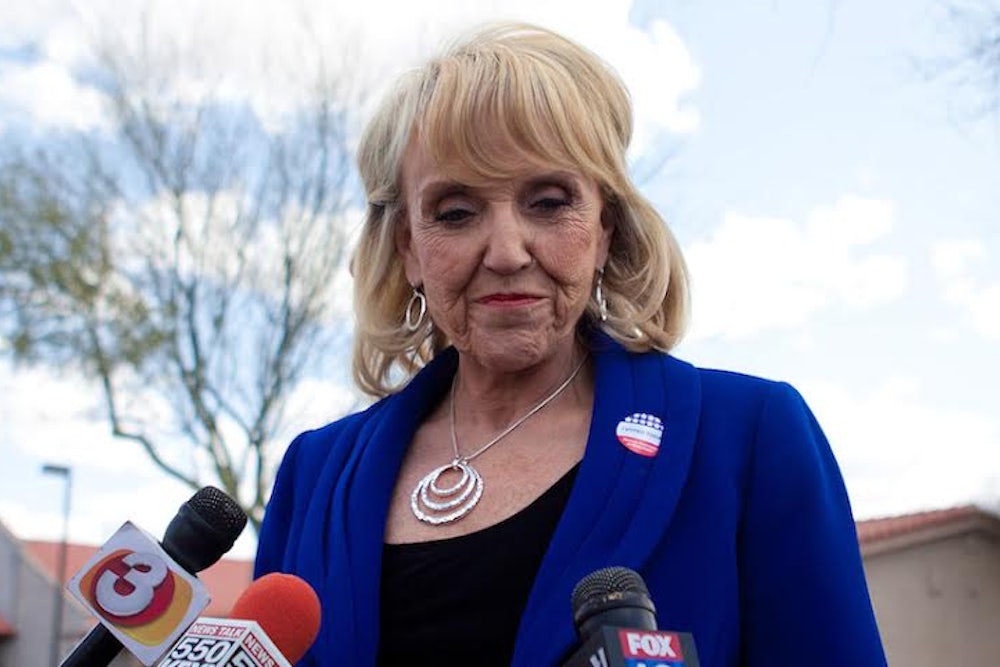Two notable pieces of legislation have hung in the balance this week in state capitals.
One, in Arizona, is a bill to give businesses the right to refuse to serve gays and lesbians if they felt doing so violated their religious beliefs. It was inspired by a legal controversy in adjacent New Mexico over a wedding photographer who refused to take pictures at a same-sex wedding. As symbolically noxious as the bill was, it was unclear just how much practical impact it would have when added to the web of existing laws guarding against discriminating and protecting religious freedom.
The second one, in Arkansas, had a more straightforward upshot: the state legislature is deciding whether to maintain the Medicaid expansion under the Affordable Care Act that has so far covered 127,000 people in the state. As it now stands, Republicans in the legislature who are opposed to the expansion—even though it was done via a private-insurer approach rather than by Medicaid proper—appear on the verge of undoing it. The Republicans in opposition include one representative whose $1 million recovery from a drunk-driving accident was mostly paid for by Medicaid.
One of these legislative disputes was deluged with attention this week: it sparked a national furor, with the NFL threatening to move its next Super Bowl, countless businesses urging a veto, a front-page story and op-ed column in today’s New York Times, a “Daily Show” segment, etc. And liberals won it, decisively.
The other one has been carrying on in virtual obscurity. Hint: it’s not the one sparked by a fight with the wedding photographer.
This dynamic is hardly new: for a while now, liberals around the country have been faring far better when it comes to social and civil rights issues such as same-sex marriage than they have on economic issues such as taxes, organized labor and the safety net. But the contrast between the liberal response to—and media coverage of—the disputes in Arizona and Arkansas this week has been especially stark. Liberals should by all means celebrate victories like the Republican Arizona Governor Jan Brewer’s vetoing of the discriminatory bill and the uproar in the Arizona business community that prompted the veto, which represent yet another marker in the hearteningly rapid advance of equal rights for gay Americans.
But liberals who care about economic justice and fairness as well should ask themselves why there has been so much less uproar over legislative fights like the one in Little Rock that are going to have a very real and very immediate impact on tens of thousands of people—poor and working class people who thought they’d finally gotten health coverage only to have it yanked back a few months later. (It’s been striking, for one thing, to see Brewer, who once wagged her finger at President Obama on an airport tarmac, hailed as an unlikely liberal heroine over her veto, when she got no equivalent adulation for bucking her party to push through the Medicaid expansion in Arizona.)
We know some of the reasons for the disparate level of coverage and response. The Arizona bill presented a clear and simple target, whereas the Medicaid expansion battle is a morass. After all, in addition to Arkansas there are the two dozen states that have yet to approve the expansion at all; it’s only because Arkansas had already seemed well down the road toward expansion that the legislature’s turnabout is especially disheartening.
Second, there is the contrast in organizational and special interest support. The marriage equality movement has evolved into a strikingly broad and influential force, whereas, as Kevin Drum notes again today, the organizations that once led the fight on economic justice—unions—are in a long decline. In Arizona, business leaders across the spectrum feared fallout from the passage of the discriminatory law, whereas in Arkansas and the states without expanded Medicaid, the only element of the business lobby pushing hard for it is the health industry.
Finally, there is the more nebulous difference between the two causes: put simply, marriage equality is on a roll right now, and everyone likes a winner. When a discriminatory law passes in this or that state, it now seems only a matter of time before it will come crashing down—it’s fun to join the pile on and inevitable end-zone dance.
But liberalism—and the party it is aligned with—is in big trouble if its adherents get used to taking on only the fun and easy fights. It’s not just the plight of those 127,000 Arkansans and their five million counterparts in the states that are blocking the Medicaid expansion that is at stake. It is also the control of the Senate and the overall Democratic agenda. After all, the lack of pushback in Arkansas against attempts to eliminate the coverage expansion will make it only harder for Senator Mark Pryor to overcome the huge anti-Obamacare ad assault he is being hit with from outside conservative groups.
And here’s the thing: liberals shouldn’t be viewing these fights in Little Rock and other red and purple state capitals as necessarily hopeless. The polling on Medicaid expansion is surprisingly strong—even in deep-red Kansas!—and there are Democratic senatorial candidates, such as Gary Peters in Michigan, who are more than happy to take on Republicans and Koch Brother-funded ads attacking the expansion (which, in Michigan, will extend coverage to a whopping 400,000 people.) If anything, this is an issue that Democrats and liberals should be trying to capitalize on—making it clear to millions of lower income voters who may have voted Republican in the past or not voted at all in the midterms that it is they, the Democrats, who are pushing for them to get covered.
But that will only happen if the fight is engaged, if liberals realize they can take on bright shiny objects like the Arizona law and also wage the drawn-out, day-in, day-out battle for economic justice.
